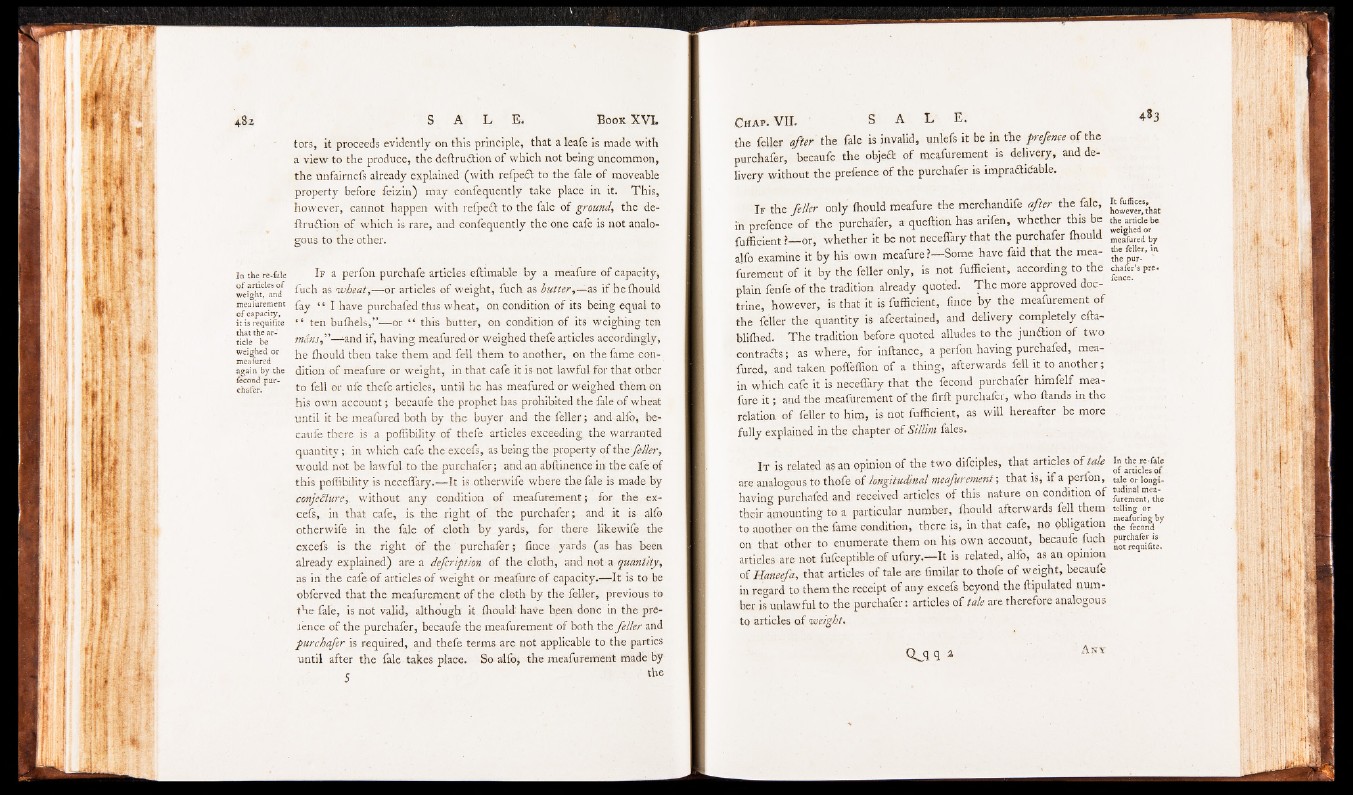
In the re-fale
o f articles of
weight, and
meafurement
o f capacity,
it is requisite
that the article
be
Weighed or
meafured
again by the
fécond pur-
chafer.
tors, it proceeds evidently on this principle, that a leafe is made with
a view to the produce, the deftrudion of which not being uncommon,
the unfairnefs already explained (with refped to the fale of moveable
property before feizin) may confequently take place in it. This,
however, cannot happen with refped to the fale of ground, the deftrudion
of which is rare, and confequently the one cafe is not analogous
to the other.
If a perfon. purchafe articles eftimable by a meafure of capacity,
fuch as wheat,— or articles of weight, fuch as butter,—as if he Ihould
fay “ I have purchafed this wheat, on condition of its being equal to
“ ten bufhels,”— or “ this butter, on condition of its Weighing ten
mans,” —^and if, having meafured or weighed thefe articles accordingly,
he Ihould then take them and fell them to another, on the fame condition
of meafure or weight, in that cafe it is not lawful for that other
to fell or ufe thefe articles, until he has meafured or weighed them on
his own account; becaufe the prophet has prohibited the file of wheat
until it be meafured both by the buyer and the feller; and alfo*, becaufe
there is a poffibility of thefe articles exceeding, the- warranted
quantity; in which cafe- the;excefe, as being the property of the-JoHer,
would not be lawful to the purchafer; and an abftinence-in the cafe'of
this poffibility is neceflary.-*-It is otherwife where the fale is made by
conjeilurej, without any condition of meafurement;- for the excels,
in that cafe, .is the right of the purchafer;. ..and- it is- alfo
otherwife in. the fale of cloth by yards, for there- likewife the
excefs is the right of the purchafer; fence yards (as has been
already explained) area dejcripti'on of the cloth, and not a quantity,
as in the cafe of articles o f weight or meafure ©f capacity.— It is to be
obferved that the meafurement of the cloth- by the feller, previous to
the fale, is not valid, although it. Ihould: have been done in the pretence
of the purchafer, becaufe the meafurement of both the feller and
purchafer is required, and thefe terms are not applicable to the parties
until after the fale takes place. So alfo, the meafurement made by
5 the
C h a p . VII. S A L E .
the feller after the fale is invalid, unlefs it be in the prefenee of the
purchafer, becaufe the objed of meafurement is delivery, and delivery
without the prefence of the purchafer is ineradicable.
If the feller only fhould meafure the merchandife after the fale,
in prefence of the purchafer, a queftion has arifen, whether this be
fufficient ?— or, whether it be not neceflary that the purchafer Ihould
alfo examine it by his own meafure?— Some have faid that the meafurement
of it by the feller only, is not fufficient, according to the
plain fenfe of the tradition already quoted. The more approved doctrine,
however, is that it is fufficient, fence by the meafurement of
the feller the quantity is afeertained, and delivery completely efta-
bliffied. The tradition before quoted alludes to the jundion of two
contrads; as where, for inftance, a perfon having purchafed, meafured,
and taken pofleffion of a thing, afterwards fell it to another;
in which cafe it is neceflary that the fecond purchafer himfelf meafure
i t ; and the mealurement of the firfl: purchafer, who Hands in the
relation of feller to hint, is not fufficient, as will hereafter be more
fully explained in the chapter of Sillim fales. .
I t is related as an opinion of the two difciples, that articles of tale
are analogous to thofe o f longitudinal meafurement-, that is, if a perion,
having purchafed and received articles of this nature on condition of
their amounting to a particular number, Ihould afterwards fell them
to another on the fame condition, there is, in that cafe, no obligation
on that other to enumerate them on his own account, becaufe fuch
articles are not fufceptible of ufury.— It is related, alfo, as an opinion
of Haneefa, that articles of tale are fimilar to thofe of weight, becaufe
in regard to them the receipt of any excefs beyond the ftipulated number
is unlawful to the purchafer: articles of tale are therefore analogous
tq articles of weight,
A ny
It fufEces,
however, that
the article be
weighed or
meafured by
the feller, in.
the pur-
chafer’s pre«
fence.
In the re-fale
of articles of
tale or longitudinal
meafurement,
the
telling or
meafuring by
the fecond
purchafer is
not requilite.
Qjiq ft